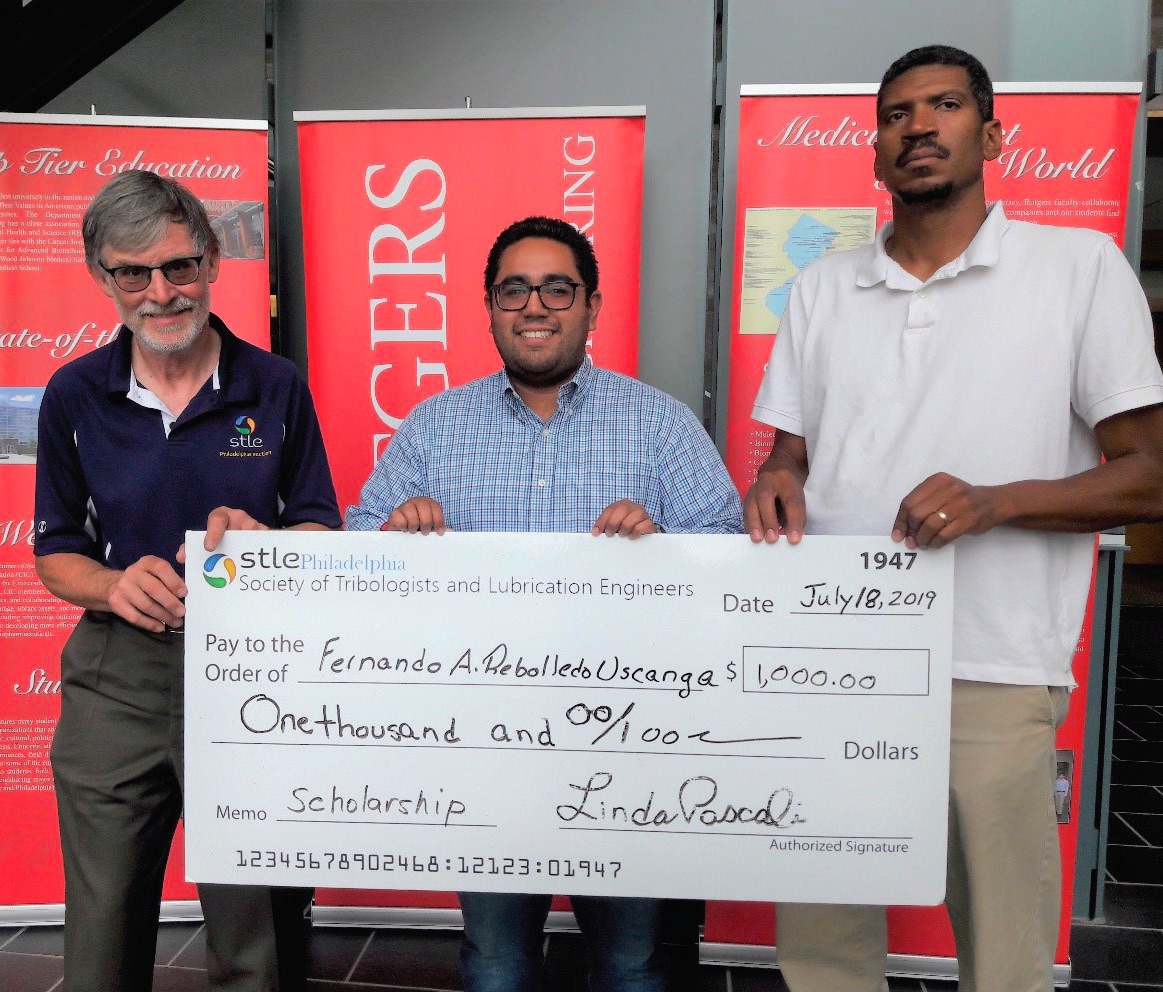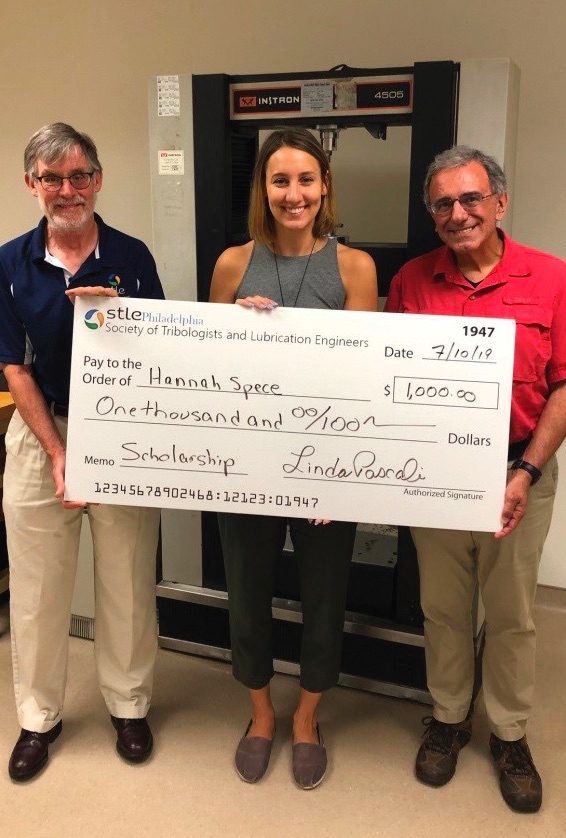TLT: How did you get into tribology?
Tuszynski: Entirely by accident. My training is as a physical organic chemist with an interest in reaction mechanisms in organic transformations. Tribology was rarely in my first job at Pennwalt. I was doing application research for the company’s lines of thiochemicals and amines that each had a myriad of industrial uses. Most of my time was spent on products used in natural gas processing, electroplating and petroleum refining with a small part of my time spent on products used in metalworking. After Pennwalt was purchased by Elf Aquitaine, I went into new product development and had a small role in the development of t-butyl trisulfide as an extreme-pressure additive but was mostly active in agricultural chemical and pharmaceutical intermediates and products for natural gas production.
My first real involvement with lubricants was at Inolex where the Lexolube® esters were a significant part of the industrial business. During that time, we began to pivot away from focusing primarily on the fiber lube market to developing specialty products for refrigeration, metalworking and other industries.
Sebacic acid, which is used in greases and as a corrosion inhibitor, was a significant area at Ivanhoe when we bought the company. I became the prime contact for our lube accounts at that time. In addition to the sebacic acid business, we then added complimentary products and agencies to broaden our product portfolio to the lubricants industry.
While I still have customers outside the lube industry, the vast majority of my time at Unami Group is in the industry. Much of that is in products for synthetic and environmentally acceptable lubricants following the strengths of the companies I represent: Zschimmer & Schwarz, Functional Products and Ivanhoe Industries.
TLT: What motivates you to volunteer your time and energy to STLE?
Tuszynski: I’ve always felt that you should give back by volunteering if you belong to an organization. With STLE, my preference is to work at the local level with the STLE Philadelphia Section, particularly through the section’s Scholarship Program. One consistent theme in the STLE 2020 Report on Emerging Issues and Trends in Tribology and Lubrication Engineering is the need to be able to attract young people to come into the tribology community, and our program helps address this concern. Our focus is at the undergraduate and graduate level, so we are dealing with students who are already on the STEM track. The hope is that our support influences them to go into the field of tribology as a career. We connect to our award winners via LinkedIn to follow their career progress, and many of our awardees do hold positions in tribology, both in industry and academia. We’re especially proud that women make up a significant proportion of our awardees every year.
A number of our students and early careerists have been recognized with STLE awards. 2020 winners include Dr. Tevis Jacobs (Early Career Academic Professional) and Elmer E. Klaus Achievement winners Arnab Bhattacharjee and Tomas Babuska. Both Jeanie S. McCoy Scholarship winners, Meghan Kupratis (2020) and Kathryn Hasz (2019), were STLE Philadelphia Section Scholarship winners.
On several occasions, students have solicited help in their job search, and we’ve been fortunate to have helped them make successful connections.
For pre-college students, the STLE Philadelphia Section has participated in the Delaware Valley Science Fair to give awards to sixth to 12th grade students for lubrication-related projects.
TLT: As a leader of the STLE Philadelphia Section Scholarship Committee, how do you decide which of the deserving students earn scholarships?
Tuszynski: Our main problem is an embarrassment of riches. Our region includes New Jersey, Eastern Pennsylvania, Delaware and Maryland, and we have a list of over 150 department heads and deans at 39 colleges and universities. Included in that list are professors Robert Carpick (University of Pennsylvania), David Burris (University of Delaware) and Brandon Krick (formerly at Lehigh University—but now has relocated to Florida State University), all of whom are STLE members. We also get regular submissions from Drexel University, University of Maryland, Villanova University and, more recently, Rutgers University, among other schools.
 From left to right: Bill Tuszynski, scholarship awardee Fernando A. Rebolledo Uscanga and graduate program director Dr. Joseph W. Freeman.
From left to right: Bill Tuszynski, scholarship awardee Fernando A. Rebolledo Uscanga and graduate program director Dr. Joseph W. Freeman.
The breadth and quality of the tribology research we see is awe-inspiring. Topics include nanotribology, biotribology, additive manufacturing, low-friction and wear- resistant composites, advanced ceramics, fundamental studies of surface physics and mechanics. One of the more interesting research topics involved wear studies on dinosaur teeth to understand how they evolved in response to their diets.
The awardees are selected by a committee of three to five volunteers. Committee members receive the applications in advance of the meeting and score them on a 1-3 scale. Rankings are shared and tabulated, and then we discuss them to come to a consensus as to who should receive awards. Those decisions are made independent of the amount of available funds. The next step is to allocate the award amounts. We aim to give a minimum of $1,000 if possible.
We typically have a mix of graduate and undergraduate students among our applicants. Undergraduate students are judged primarily on their academic record and letter of recommendation. It is not a requirement but a strong plus if they have had the opportunity to do research. We judge graduate students on the quality and relevance of their research, while the letter from their supervising professor carries much weight.
The best part of the job is when we meet up with the students for a photo op with the section’s “big check.” The pictures shown are from 2019. We were unable to meet in person with the 2020 winners because of the COVID-19 pandemic and hope to resume seeing them in person in 2021.
While I am staying on the Scholarship Committee, I have stepped down as chair in favor of Jeremy Styer of Vanderbilt Chemicals. There should always be room for fresh blood and new thinking in how we do things, and it also is important for others to step into leadership roles in the section.
TLT: The STLE Philadelphia Section routinely invites scholarship winners to give presentations at the local section meetings. How has this benefitted the students and STLE?
Tuszynski: We have students do both oral and poster presentations, and there are a number of benefits. The students benefit from being able to practice their presentation skills and having the chance to network with industry professionals. Industry attendees benefit from learning about cutting-edge research in the field. Much of our funding comes from corporate and individual donations, and it is important for donors to see that their money is invested wisely. Profiles of each awardee are posted on the section website (
https://philadelphia-stle.org), and we also submit them for inclusion in a fall issue of TLT.
Besides our corporate donors, individuals can make an optional donation to the Scholarship Fund when they register for section meetings, and we also hold a golf outing to benefit the Scholarship Fund. Our section greatly appreciates STLE’s Matching Funds Program as an important part of our fundraising.
TLT: Are there other good ways to bring people together from academia and industry to benefit the overall mission of STLE?
Tuszynski: Meetings like the STLE Annual Meeting and Tribology Frontiers Conference are important venues for academics and industry professionals to meet and exchange ideas that can lead to collaboration. The challenge is to find ways to translate those interactions to the local level.
 From left to right: Bill Tuszynski, scholarship awardee Hannah Spece and STLE Scholarship Committee member Salvatore Rea.
From left to right: Bill Tuszynski, scholarship awardee Hannah Spece and STLE Scholarship Committee member Salvatore Rea.
We’ve been able to have several local professors present at STLE Philadelphia Section meetings and have had student attendees when the topic was of interest. Additive manufacturing is one area where both the industrial and academic communities are actively working, and the potential for cooperation is high.
One idea we are considering is for members of the section to make presentations about STLE and careers in tribology to students and faculty at local colleges and universities. We can take advantage of the relationships we have at schools where we have given scholarships to their students.
TLT: What would you say is your most important contribution to the lubricants community?
Tuszynski: This is something of an odd question, as it has only been in the last 15 years that I’ve spent the majority of my time in the industry—and all of that in a commercial function. Before that, I’ve been spread across a number of diverse industries. Within lubricants, I would say my most significant technical contribution was serving as editor of the NLGI Grease Guide, Sixth Edition. With the advent of the new NLGI High-Performance Multiuse Grease Certification, we have started working on an expanded seventh edition, where I’m serving as co-editor with STLE member Raj Shah of Koehler Instruments.
TLT: How do we encourage young people to pursue careers in tribology?
Tuszynski: It is well documented that young people entering the workforce have strong expectations of making a difference in society as part of their career. We need to emphasize the role of lubrication in improving machinery efficiency to mitigate climate change, along with the growing emphasis on sustainable and environmentally friendly lubricant products in reducing pollution and waste streams.
The unique challenge in attracting students to tribology is that it is not a standalone academic field in which students can declare a major. Obviously, a good portion of tribology resides in mechanical engineering departments, but there is a lot of chemistry, physics, materials science and polymer science in the discipline. Schools might have a professor or two whose research interests are in tribology but rarely enough to make a department or major. Auburn University’s Tribology and Lubrication Science Minor Program is a big step forward that I hope other schools with faculty active in tribology can replicate. STLE’s STEM Program at the Annual Meeting is excellent but a one-time event where local companies, sections and members should be doing follow-up.
Companies can play an important role by providing internships to undergraduate students to give them exposure to the industry and an appreciation for the complexity of the formulations they see on the shelf in stores.
You can reach Bill Tuszynski at w.tuszynski@unamigroup.com.